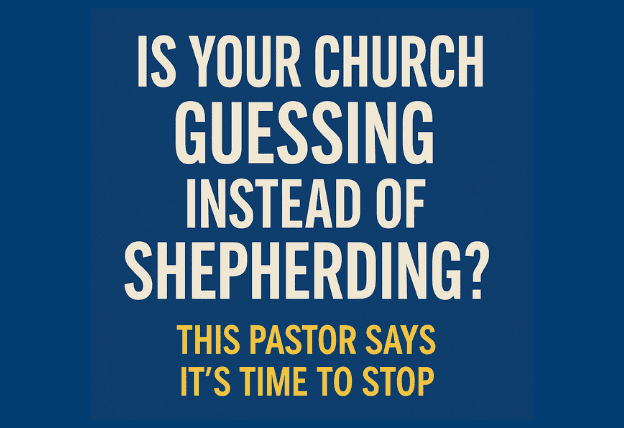Don’t Just Guess
Through the process of first listening to the congregation, we’re now convinced that knowing is greater than guessing. Here’s an example:
A few years ago, as America was coming out of the pandemic, our leadership team met to look ahead. We wanted to gain a sense of what God had in store next for our church. As a veteran pastor, I had a hunch it was time to either build a bigger worship auditorium or plant another multi-site. So, on a Sunday morning in January, we administered the Church Pulse survey to members. More than 2,500 people participated, which is a very good sampling. Next, we invited the entire congregation to join us in 40 days of prayer and fasting—and to share feedback about what they were sensing. To do that, we used a free texting service provided by Gloo.
When we received the results, a significant finding stood out. Our congregation was struggling with mental health and overall well-being, especially among Millennials. Soon afterward, our county in Kansas released a study that cited mental health as the area’s No. 1 challenge. Then, believe it or not, the organization Mental Health America released a national study about how each state was doing in terms of psychological well-being. We assumed that California, New York, or Washington D.C. would be at the bottom of the list. To our surprise, our state was dead last! How could the home of Dorothy and Toto be struggling so much? Clearly, we weren’t in that Kansas anymore.
Thanks to all that information, our church had clarity. We knew it wasn’t time to build a bigger auditorium or plant a new multi-site. Instead, it was time to double down on the mental health of our congregation, county, and state. The texts that church members sent us during the period of prayer and fasting only confirmed that we heard correctly.
Next, church leadership moved to assemble an action plan. Part One was centralized. We decided to greatly expand our capacity to care for the mental, emotional, relational, and financial health of our congregation and county. That included building a new 20,000-square-foot Care Center to house Christian counselors, Care Groups, benevolence, Stephen Ministries, and our church’s foster and adoption ministry. In a recent 11-month timespan, we conducted 6,109 counseling appointments!
Part Two of the plan was decentralized. We chose to organize our congregation into smaller communities, centered primarily around elementary-school boundaries. Think of it as a multi-site without walls. Each Area Community has a shepherding couple and a neighborhood captain for each of the eight to 10 neighborhoods within the area.
The vision is simple: Create a deep sense of “connected community” (an area that Church Pulse recommended we focus on) and “serve others” (another area the survey suggested we improve).
Our message to the Westside Family congregants?
Your Area Community is your mission field. Don’t let anyone fall through the cracks on your watch. Meet one another’s needs and the needs of people around you—in your neighborhood, at your elementary school, the widows, the orphans, the hurting. Wrap God’s love and family around these precious people. Meet them at their point of pain.
We also created training classes; for example, Care Like Jesus equips congregants to come alongside neighbors and listen to them, pray for them, and direct them to our church’s centralized care resources. So far, we’ve launched 14 Area Communities. By 2027, God willing, 20 more will be in place. The territory that covers is breathtaking!
The Ministry of Listening
One feature of the Area Community will make Dr. Player, my former physician, very proud. Twice a year, Area Shepherds contact each member of the Area Community. They sit down with people to listen to them…to see how they’re really doing. The shepherd simply asks congregants about the seven dimensions of human flourishing represented in the Church Pulse survey. How’s your spiritual life? How are your relationships? How are you doing financially? How’s your health? How’s your job going? The Area Shepherd then rallies community members to come alongside anyone who’s struggling or points them to our Care Center.
Previously, our church attracted visitors through seeker-driven or seeker-sensitive weekend services. But these days, I believe care is the new attractional strategy. Acts 2:42-46 describes how members of the first church devoted themselves to belonging, growing, and meeting the needs of people around them. As a result, “the Lord added to their number daily those who were being saved” (Verse 47, NIV). We try to follow suit, focusing on our part and letting God focus on his.
That is precisely what’s happening at Westside. I think it’s one of the main reasons our congregants rate us high in the Church Pulse category of “trusted leadership.” We’re growing without focusing on growth. In fact, we may need to build that new worship center or launch a new site after all.
I share my story not so you’ll replicate it. After all, our church’s focus likely isn’t your church’s focus, and our members’ needs likely aren’t your members’ needs. That’s the point! Jesus designed the Christian church to be local, with local shepherds. Ministry is not a one-size-fits-all endeavor. I share my story to demonstrate the power of listening to people as your starting point.
I’m glad our congregation experienced a wake-up call a few years ago. In hindsight, I’m convinced that building a bigger worship auditorium or launching another campus would have been akin to removing my gallbladder. It was just a hunch. A very bad hunch.

